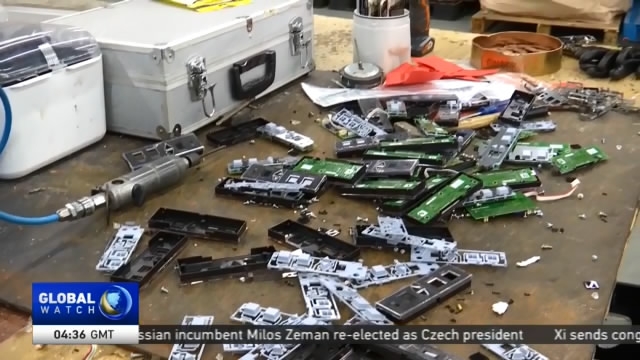
13:40, 28-Jan-2018
E-Waste Control: HK plans to cut down on electronic waste

Hong Kong has become a dumping ground for e-waste in particular, mainly from the United States. Recycling sites extract valuable materials and export them to other places to make money. The regional government plans to reduce e-waste and step up regulation of the recycling industry. CGTN's Li Jiejun has more.
Hong Kong, one of the richest cities in the world, is also the electronic garbage dump of Asia. Insiders say containers filled with electronic waste enter the port every day. And Hong Kong also produces 70,000 tons of its own waste every year. That means televisions, printers, computers and other electronic waste are piling up. Most of the waste is recycled here and exported for reuse.
JACKY LAU HK ENVIRONMENTAL PROTECTION PRACTITIONERS ASSOC. "Much of the e-waste arriving in Hong Kong is from the US. The recyclers extract the valuable parts, like the metals from the hard disks, which can be sold at 300,000 Hong Kong dollars a ton. The remnants, like glasses and plastics in the monitor is disposed or burned in the city."
When the waste arrives in the city, most of it is sent to remote areas. This is a village in the north of Hong Kong. Driving along the road, we see dozens of irregular e-waste recycling facilities.
LI JIEJUN HONG KONG "There are hundreds of sites across the New Territories where e-waste is processed. Most are illegal. The workshops dismantle, separate and sort metals and plastics, which are sold and shipped to buyers around the world like Africa and Southeast Asia. But the operations cause severe environmental damage to the region."
Most of these workshops are built on land zoned for agriculture. Toxic chemicals can be produced during the processing and cause soil and water pollution. And improper waste dumping can cause fires. The regional government says it's taking the problem seriously. And this electronics recycling plant with a government license could set an example for others. In the clean factory, computers, televisions, mobile phones and electronic tools are been recycled carefully.
VINCENT KAN DIRECTOR, VANNEX INTERNATIONAL "We don't import e-waste. Everything that arrives in our factory comes from Hong Kong. Over 5,000 tonnes are processed every year. We dismantle and sort the different parts carefully, and export things that are useful. For example, the circuit boards will be sent to Japan. We put the chemical waste in a safe place so it won't cause any environmental problems."
The government will commence licensing and permit controls at the end of 2018. That means 90 percent of the current recycling sites will close if they cannot meet the application requirements. Then the situation is expected to get much better. LJJ, CGTN, HK.

SITEMAP
Copyright © 2018 CGTN. Beijing ICP prepared NO.16065310-3
Copyright © 2018 CGTN. Beijing ICP prepared NO.16065310-3